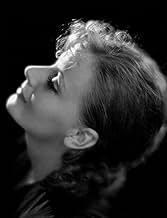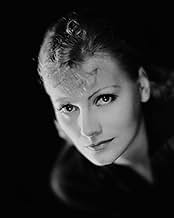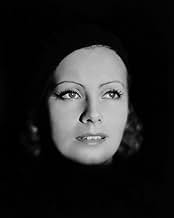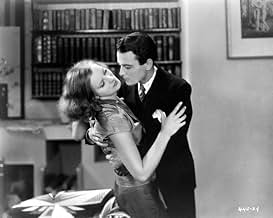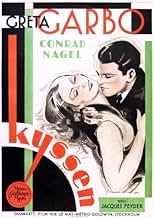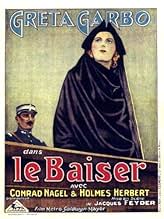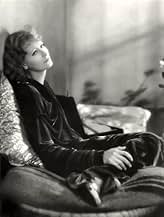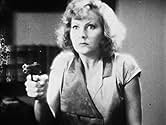ÉVALUATION IMDb
6,8/10
1,3 k
MA NOTE
Ajouter une intrigue dans votre langueAn unhappily married woman is caught up in scandal and murder when her affection toward a young man is misinterpreted.An unhappily married woman is caught up in scandal and murder when her affection toward a young man is misinterpreted.An unhappily married woman is caught up in scandal and murder when her affection toward a young man is misinterpreted.
- Director
- Writers
- Stars
Symona Boniface
- Gossip in Museum
- (uncredited)
Allan Cavan
- Prison Warden
- (uncredited)
André Cheron
- Prosecutor
- (uncredited)
Carrie Daumery
- Party Guest
- (uncredited)
Ruth Feldman
- Scrubwoman
- (uncredited)
Lee Phelps
- Tour Guide
- (uncredited)
Philip Sleeman
- Lounge Lizard
- (uncredited)
Avis en vedette
"The Kiss" happens about midway into the movie ... Greta Garbo gives young admirer Lew Ayres a friendly kiss goodbye as he's about to leave town, Ayres, who cannot control his infatuation with the beautiful Garbo, goes in for another, less platonic kiss, at which point Garbo's husband sees them from afar and goes berserk. A fight amongst the three ensues, gets carried into another room where the door is shut to us, the audience, and we hear a shot. Garbo's husband is dead, but who did it?
Prior to the "kiss" moment, we've seen Garbo and her lover (Conrad Nagel) in a torturous romance ... they both love each other madly but Greta doesn't see any way out of her loveless marriage. In the meantime, Lew Ayres follows Greta around like a puppy dog; he's an 18-year-old completely infatuated with the beautiful married lady.
The latter half of the movie deals with the investigation of the husband's death, Greta's arrest, and her trial where she is defended by Nagel who in addition to being her former lover is also a lawyer.
I won't give away the outcome of the trial, but I will say that the jury believes it is Person A who did it and after the trial we learn it was Person B.
The musical score to this flick was absolutely horrible. I especially could have done without the "Romeo and Juliet" theme that was played every time the flick wanted to telegraph Greta's and Conrad's love to the audience.
Despite the score, this was a very enjoyable silent movie. I find some silents tedious, others quite well done. "The Kiss" definitely falls into the latter category. Worth watching.
Prior to the "kiss" moment, we've seen Garbo and her lover (Conrad Nagel) in a torturous romance ... they both love each other madly but Greta doesn't see any way out of her loveless marriage. In the meantime, Lew Ayres follows Greta around like a puppy dog; he's an 18-year-old completely infatuated with the beautiful married lady.
The latter half of the movie deals with the investigation of the husband's death, Greta's arrest, and her trial where she is defended by Nagel who in addition to being her former lover is also a lawyer.
I won't give away the outcome of the trial, but I will say that the jury believes it is Person A who did it and after the trial we learn it was Person B.
The musical score to this flick was absolutely horrible. I especially could have done without the "Romeo and Juliet" theme that was played every time the flick wanted to telegraph Greta's and Conrad's love to the audience.
Despite the score, this was a very enjoyable silent movie. I find some silents tedious, others quite well done. "The Kiss" definitely falls into the latter category. Worth watching.
I've got to admit up front that I have long felt that Greta Garbo was a bit overrated as an actress. All too often, she was stuck in super-melodramatic films involving either adultery or with Garbo playing an irresistible "super-vamp". While the public loved this persona, the films seemed quite derivative and clichéd. There are only so many films like this you can watch until they blend together.
Fortunately, she also made some dandy films like NINOTCHKA, QUEEN Christina and THE KISS. While superficially the film seems just like another adultery film, Garbo was given better material--as she was a woman who WANTED to commit adultery but couldn't bring herself to cheat on her much older husband. I'm glad the film didn't pursue this expected plot line but instead the film is about the consequences when the husband THINKS she's cheating on him when she isn't. This led to a dandy finale where there is a nice plot twist.
Overall, this film excelled because Garbo did NOT stare in a pained way into space as she so often did in films where she played a married woman trapped in a loveless marriage. Here, she plays a more believable and well-rounded personality--someone who seemed much more human than the usual Garbo character.
With good production values and only one minor problem (a repetitive and sappy soundtrack), this is well worth a look.
Fortunately, she also made some dandy films like NINOTCHKA, QUEEN Christina and THE KISS. While superficially the film seems just like another adultery film, Garbo was given better material--as she was a woman who WANTED to commit adultery but couldn't bring herself to cheat on her much older husband. I'm glad the film didn't pursue this expected plot line but instead the film is about the consequences when the husband THINKS she's cheating on him when she isn't. This led to a dandy finale where there is a nice plot twist.
Overall, this film excelled because Garbo did NOT stare in a pained way into space as she so often did in films where she played a married woman trapped in a loveless marriage. Here, she plays a more believable and well-rounded personality--someone who seemed much more human than the usual Garbo character.
With good production values and only one minor problem (a repetitive and sappy soundtrack), this is well worth a look.
In Lyons, Irene Guarry (Greta Garbo) is not happy with her marriage with the old businessman Charles Guarry (Anders Randolf) and is in love with the young lawyer André Duball (Conrad Nagel). Irene knows that the jealous Charles will never give the divorce to her; therefore they decide to stop seeing each other since she does not want to be an unfaithful wife and defy the convention. André also decides to move to Paris. One day, Irene knows the eighteen year-old college student Pierre Lassalle (Lew Ayres) in a party during his vacation and she learns that the youngster is infatuated with her. By the end of his vacation, Pierre asks a photo for Irene and she promises to give one to him. Meanwhile Charles has a meeting with Pierre's father Lassalle (Holmes Herbert) and discloses that he is on the verge of bankruptcy. Lassalle promises to help his friend and they schedule a meeting in the night. When Charles goes to the encounter, Pierre arrives at his home and asks for a goodbye kiss to Irene. Meanwhile Charles does not feel well and returns home, witnessing their kiss. Charles tries to kill Pierre and later the student arrives home and tells his father that Charles is dead. Irene is arrested accused of murdering her husband. What happened in Charles's office?
"The Kiss" is a melodramatic romance and the last MGM and Greta Garbo's silent film and the debut of Lew Ayres. The movie has beautiful shots, a mystery and Greta Garbor extremely beautiful. Despite being a silent film, MGM uses sound technology with a powerful orchestral soundtrack. My vote is seven.
Title (Brazil): "O Beijo" ("The Kiss")
"The Kiss" is a melodramatic romance and the last MGM and Greta Garbo's silent film and the debut of Lew Ayres. The movie has beautiful shots, a mystery and Greta Garbor extremely beautiful. Despite being a silent film, MGM uses sound technology with a powerful orchestral soundtrack. My vote is seven.
Title (Brazil): "O Beijo" ("The Kiss")
"The kiss" took the melodramatic accents of Feyder 's precedent work " Les Nouveaux Messieurs"and tightened them up;whereas that work should have been boiled down to a 90 min movie, "the kiss" depicts a tragedy in admirably succinct style :only 62 min,a very good screenplay which does not reveal the whole truth before the last minutes.It's the classic story of the divine lady married with a graybeard without love ,in love with a more handsome gent;add a young man,pretending to be a man (the subject of the immature young lad will come back later in Feyder 's career in " Pension Mimosas")and all the ingredients of a good melodrama are in it.
In Hollywood,Feyder accurately depicted his native land:in jails for women ,the wardens were nuns (in 1960 ,in Clouzot's "La Vérité" ,Brigitte Bardot was guarded by sisters too);and the gendarmes' uniforms are exactly as they were.
After this successful work (which owed a lot to G.Garbo in her last silent movie) ,Feyder was disappointed with the screenplays left for him to direct and he came back to his native land and produced his greatest achievements :"Le Grand Jeu" ,"Pension Mimosas" and his masterpiece "La Kermesse Héroique".
In Hollywood,Feyder accurately depicted his native land:in jails for women ,the wardens were nuns (in 1960 ,in Clouzot's "La Vérité" ,Brigitte Bardot was guarded by sisters too);and the gendarmes' uniforms are exactly as they were.
After this successful work (which owed a lot to G.Garbo in her last silent movie) ,Feyder was disappointed with the screenplays left for him to direct and he came back to his native land and produced his greatest achievements :"Le Grand Jeu" ,"Pension Mimosas" and his masterpiece "La Kermesse Héroique".
In star Greta Garbo's silent films especially, I think the stories are secondary to the images. They tend to be similarly melodramatic romances about adultery and love triangles and the surrounding scandals and tragedies. This one is more of a love rectangle, with Garbo's husband and the characters played by Conrad Nagel and Lew Ayres all trying to possess her. It's a generic formula, especially for the vehicles of MGM's star Garbo. Yes, there's a mystery element, but that's none too appealing, either. There's even dinner-party and courtroom scenes, and, of course, her husband is an old rotund businessman. The title cards are gushy, and the musical score, including the love theme from Tchaikovsky's "Romeo and Juliet," is unoriginal. Yet, the narrative does focus in some interesting and different ways on Garbo's image, and this is yet another lovely-looking late silent film, as Garbo's 1920s MGM productions tend to be. It's fortunate that Garbo, with her foreign accent, was the last of the studio's stars to transition to talkies--this being the last silent film of both Garbo and MGM--because they're some of the most deliberately gorgeous pictures of the era. They're far superior to the awkward early talkies concurrently being made by others.
Appropriately, "The Kiss" begins with Garbo and one of her lovers in a French art gallery; from there, the film itself is a piece of visual art. Much of that is the glossy close-ups of Garbo's face, but there's an emphasis on shots of her walking and riding away from men in this one, too. There are several overhead establishing shots, superimposed images and dolly-shot transitions. The best moving camera shot is in the assault scene, with the camera pulling back after the door closes. The gunshot and phone ringing are also a better use of sound effects than in most contemporary talkies. There are two flashback scenes of this incident as narrated, or imagined, by Garbo--one is a lie and the other, presumably, is the truth. Both are filmed differently and from different angles than the first instance. The Art Deco sets are impressive, too--mainly for Garbo's home. The abstract skyscrapers design on her bedroom wall is a standout. Additionally, there's the motif of Garbo's image: Ayres wants a photograph of her, the newspapers print her image, the courtroom artists draw it, while the overall film and machinery of MGM's star making focuses on creating it. In this case, that machinery is partly of European imported artists, including Garbo herself, the director and the writer. The transition to talkies would surrender much of such foreign talent, although, fortunately, not Garbo.
With about an hour runtime, this is a relatively-brief feature and taut. For instance, when the husband has his wife tailed, it's to establish his jealous suspicions, which are sure to foreshadow later events. And when we're shown "Chekhov's gun," expect it to be fired by the end.
Appropriately, "The Kiss" begins with Garbo and one of her lovers in a French art gallery; from there, the film itself is a piece of visual art. Much of that is the glossy close-ups of Garbo's face, but there's an emphasis on shots of her walking and riding away from men in this one, too. There are several overhead establishing shots, superimposed images and dolly-shot transitions. The best moving camera shot is in the assault scene, with the camera pulling back after the door closes. The gunshot and phone ringing are also a better use of sound effects than in most contemporary talkies. There are two flashback scenes of this incident as narrated, or imagined, by Garbo--one is a lie and the other, presumably, is the truth. Both are filmed differently and from different angles than the first instance. The Art Deco sets are impressive, too--mainly for Garbo's home. The abstract skyscrapers design on her bedroom wall is a standout. Additionally, there's the motif of Garbo's image: Ayres wants a photograph of her, the newspapers print her image, the courtroom artists draw it, while the overall film and machinery of MGM's star making focuses on creating it. In this case, that machinery is partly of European imported artists, including Garbo herself, the director and the writer. The transition to talkies would surrender much of such foreign talent, although, fortunately, not Garbo.
With about an hour runtime, this is a relatively-brief feature and taut. For instance, when the husband has his wife tailed, it's to establish his jealous suspicions, which are sure to foreshadow later events. And when we're shown "Chekhov's gun," expect it to be fired by the end.
Le saviez-vous
- AnecdotesMGM's last non-talking picture.
- GaffesIn the opening credits, the name André, Conrad Nagel's character, is spelled "Ardré."
- Autres versionsMGM also released this movie without a soundtrack, as a totally silent film.
- ConnexionsFeatured in MGM Parade: Episode #1.30 (1956)
Meilleurs choix
Connectez-vous pour évaluer et surveiller les recommandations personnalisées
- How long is The Kiss?Propulsé par Alexa
Détails
Box-office
- Budget
- 257 000 $ US (estimation)
- Durée1 heure 2 minutes
- Mixage
- Rapport de forme
- 1.33 : 1
Contribuer à cette page
Suggérer une modification ou ajouter du contenu manquant


